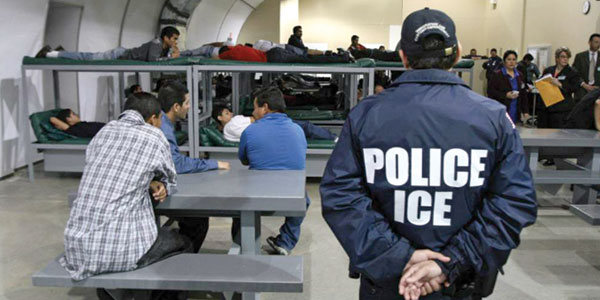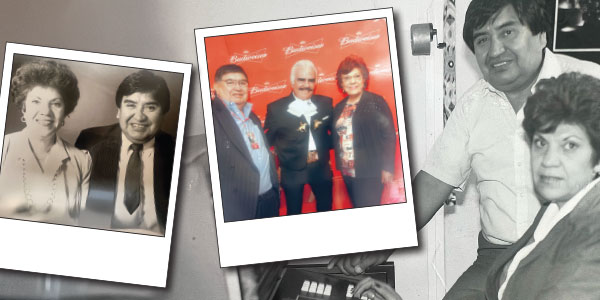
Esa es la pregunta que se hacen muchos de los 11 millones de indocumentados que viven en Estados Unidos. Y tienen razón. Se basan exclusivamente en lo que ha dicho Donald Trump en la campaña presidencial. Nada más. Por eso hay tanto temor en la comunidad hispana de Estados Unidos.
Es ridículo el tratar de normalizar a Donald Trump. Yo sí le creo: Trump de verdad piensa que los inmigrantes mexicanos son criminales y violadores, como dijo el 16 de junio del 2015. Está equivocado, pero eso es lo que piensa.
En el intento de normalizar a un candidato extremista como Trump, sus seguidores nos piden que no tomemos literalmente lo que ha dicho. Pero, ¿cómo no tomar en serio las palabras del próximo Presidente de Estados Unidos?
Algunos “trumpistas”, con sed de venganza, nos acusan a los periodistas de sembrar miedo en la comunidad latina al hablar de deportaciones masivas. Pero quisiera corregirlos aquí: Quien ha creado miedo es el mismo Trump. Nosotros solo hemos reportado lo que ha dicho, y lo que ha dicho es que quiere deportar a millones.
En su última entrevista con el programa “60 Minutos”, Trump dijo que inicialmente buscaría la deportación de hasta 3 millones de indocumentados que, según él, tienen un historial criminal. No sé de dónde sacó esas cifras, pero están equivocadas. Sólo 690 mil indocumentados han cometido algún tipo de delito serio, según el Migration Policy Institute (t.co/b5qy1VdYxi), no 3 millones.
Esos 690 mil inmigrantes con historial delictivo son apenas el 6.3% del total de la población indocumentada. Eso quiere decir que el 93.7% de los indocumentados — una vasta mayoría — es gente buena y trabajadora.
Pero el problema va a ser cuando comiencen las redadas buscando a los inmigrantes con antecedentes penales. Ellos, por supuesto, no viven solos. Esas operaciones separarían familias y crearían terror. Anthony Romero, el director de la Unión Americana de Libertades Civiles, ya lo advirtió en una entrevista con MSNBC: Hay el riesgo de violaciones a los derechos humanos, arrestos injustificados y detenciones de personas a quienes no estaban buscando.
Nadie estaba preparado para esto, ni siquiera el gobierno de México. Su secretaria de relaciones exteriores, Claudia Ruiz Massieu, ofreció un plan de 11 puntos para proteger a los 5.7 millones de mexicanos indocumentados en Estados Unidos. Las medidas incluyen el dar una mayor protección en los 50 consulados y un número telefónico de ayuda. Eso está muy bien (aquí está el video: bit.ly/2eZ8708), pero su pedido de “calma” llega tarde.
No hay ninguna calma entre millones de mexicanos — y centroamericanos — que viven en Estados Unidos. Este asunto no se puede resolver a nivel individual; es una cuestión de gobiernos. Pero está muy claro que Enrique Peña Nieto ya es un presidente irrelevante y que no tiene ninguna capacidad de negociación frente a Trump, quien lo humilló en agosto en una conferencia de prensa en la Ciudad de México.
De hecho, la contienda por la presidencia de México en el 2018 será definida, en buena medida, por quien pueda oponerse con efectividad a Trump, su muro y sus redadas. Peña Nieto ya va de salida y es uno de los presidentes más débiles que ha tenido México.
Por eso, los alcaldes de las principales ciudades de Estados Unidos — Los Ángeles, Nueva York, Chicago, San Francisco, Denver — son quienes han asumido la defensa de los indocumentados frente a Trump y mantendrán sus urbes como “santuarios”. En esas ciudades “la migra” no será bienvenida, no darán información personal de sus residentes y los cuerpos de policía no cooperarán con los arrestos.
Lo que nos espera a partir del 20 de enero es una durísima lucha por los derechos de los inmigrantes en Estados Unidos. Que Trump sea el próximo presidente no significa que tiene razón en todo. Trump insistirá en sus planes de deportaciones masivas, las más grandes jamás planeadas aquí, pero una buena parte del país aún se resiste a las ideas racistas y antiinmigrantes del ganador de la Casa Blanca. Por algo perdió el voto popular.
Vienen cuatro años muy difíciles. Sí, yo sí le creo a Trump. El miedo entre los inmigrantes es real. Pero la resistencia también.
(Jorge Ramos, periodista ganador del Emmy, es el principal director de noticias de Univision Network. Ramos, nacido en México, es autor de nueve libros de grandes ventas, el más reciente de los cuales es “A Country for All: An Immigrant Manifesto”.)
(¿Tiene algún comentario o pregunta para Jorge Ramos? Envíe un correo electrónico a Jorge.Ramos@nytimes.com. Por favor incluya su nombre, ciudad y país.)
What If Trump Deports Me?
That’s the question that millions of undocumented immigrants in the United States are now asking themselves. The fear is understandable. The Hispanic community is responding to months of Donald Trump’s anti-immigrant rhetoric on the campaign trail.
I take Trump at his word. I think he really believes that Mexican immigrants are criminals and rapists — as he said on June 16, 2015, when he announced that he was running for president. He’s wrong, of course, but that’s what he believes. Now some of Trump’s followers are trying to normalize his extremist positions by suggesting that what he has said in the past shouldn’t be taken literally. But how can one not take the next president’s words seriously?
Meanwhile, other vengeful Trumpists are accusing journalists of sowing fear in the Hispanic community by talking about mass deportations. But I’d like to point out that Trump himself sparked the panic. We journalists merely reported what he said.
In his recent “60 Minutes” interview, Trump said that he intended to deport about 3 million undocumented immigrants with criminal records. I have no idea where he came up with that figure. The Migration Policy Institute estimates that about 690,000 undocumented immigrants have a criminal record (here’s the data: t.co/b5qy1VdYxi). That’s 6.3% of the undocumented population in the U.S., compared with the 93.7% who are law-abiding.
But when the raids start, so will the collateral damage. Immigrants with criminal records don’t all live alone. Raids will needlessly split families and cause terror. The risks of human rights violations and unlawful detentions are quite real, warned Anthony Romero, executive director of the American Civil Liberties Union, in a recent MSNBC interview.
His detractors never envisioned that Trump’s rhetoric might become real. Now comes the rush to address the crisis. Earlier this month, Claudia Ruiz Massieu, Mexico’s foreign secretary, presented an 11-point strategy to help Mexico’s 5.7 million undocumented citizens living in the U.S. The plan includes offering more protection through Mexico’s 50 consulates and setting up a hotline help number (watch a video explaining the plan here: bit.ly/2eZ8708). But Ruiz Massieu’s appeal for people to be calm has come too late.
Millions of undocumented Mexicans and Central Americans in the U.S. are anything but calm. It’s quite clear that President Enrique Peña Nieto has no leverage in negotiating with Trump, who humiliated him at a news conference in Mexico City in August. Peña Nieto will go down as one of Mexico’s weakest presidents, and he’s on his way out. So the Mexican presidential race in 2018 will be defined in no small part by the candidates who can best resist Trump’s border wall and raids.
Mayors in Los Angeles, New York, Chicago, San Francisco and Denver, among other cities — are preparing to defend undocumented populations against Trump. In these so-called “sanctuary” cities, law enforcement authorities will not cooperate with immigration agents or divulge personal information about undocumented residents.
Trump’s Jan. 20 inauguration is a new threshold in the battle for immigrants’ rights. He will likely call for mass deportations — unprecedented in scale in America — just like he promised during his campaign.
But as we embark on these next four years — and they will be difficult — we should keep in mind that a large proportion of the American people still reject the president-elect’s racist, anti-immigrant views. After all, Trump did lose the popular vote.
Yes, I do believe Trump when he says something; I take him at his word. But while the fear among immigrants is real, we should be reassured that the resistance is real, too.
(Jorge Ramos, an Emmy Award-winning journalist, is a news anchor on Univision and the host of “America With Jorge Ramos” on Fusion. Originally from Mexico and now based in Florida, Ramos is the author of several best-selling books. His latest is “Take a Stand: Lessons From Rebels.” Email him at jorge.ramos@nytimes.com.)










